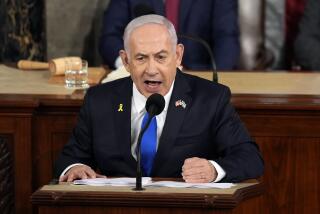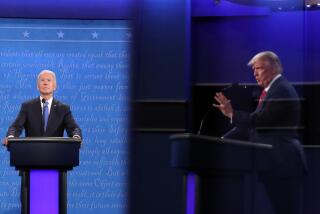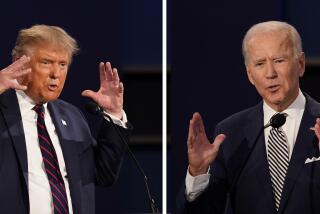Petraeus’ testimony runs into campaign
WASHINGTON — The weeklong cavalcade that will accompany Army Gen. David H. Petraeus’ return to Washington on Tuesday will look much like his pivotal visit last September: formal testimony, talk show appearances, and lots of charts and graphs.
But this time, the Iraq commander’s presentation to Congress collides head-on with a raging presidential campaign and two Democratic candidates demanding almost the opposite of his advice.
The change could prove jarring. For more than a year, Petraeus had the benefit of a commander in chief who was heavily invested in the same manpower-intensive strategy Petraeus has promoted. But he returns to Washington at a time when the country’s political leadership may soon veer sharply from the course he is advocating.
His main recommendations have been known for weeks: Draw down through July the troop buildup that was part of the surge, he will say, then wait a while to make sure Iraq doesn’t fall apart.
It is high political drama for a battlefield commander to march to Capitol Hill during the most closely watched presidential campaign in a generation. As if that were not enough, both of the antiwar Democrats who seek to be his new boss -- Sens. Hillary Rodham Clinton of New York and Barack Obama of Illinois -- sit on committees that will hear from Petraeus on his first day of testimony.
“The most interesting part of this is not going to be how Obama and Clinton behave, but how Petraeus behaves,” said Kurt M. Campbell, a military analyst who has advised Democratic presidential candidates. “Remember: Petraeus’ future now lies much more with what happens with Clinton and Obama. He’s going to go all-out to try to appear he’s not alienating Democratic friends.”
The third major presidential candidate, Republican Sen. John McCain of Arizona, also serves on a committee Petraeus will face. McCain supports Petraeus’ strategy.
In a blizzard of appearances last year, the cerebral Petraeus enjoyed a shower of public approval as he worked to quell calls for rapid troop reductions and cement the administration’s war strategy.
Petraeus aides acknowledged that this time their commander is stepping into an even fiercer political storm than during his first report. As they did in September, the aides have been running the general through exercises called “murder boards” to prepare him for the toughest questions Congress might throw at him.
And Petraeus is experienced in making his case. Over the last year he has assiduously courted other military officers, academics and congressional delegations, proving remarkably successful at converting his skeptics.
But in Washington, during a campaign season, the partisan lines for and against the war have hardened. Some analysts sympathetic to Petraeus believe that by scaling back his ambitions -- acknowledging that Iraq is unlikely to become a “Jeffersonian democracy” any time in the next decade, for instance -- Petraeus may convince Democratic contenders that achievable goals warrant a continuing presence in the country.
“The right near-to-midterm objective is an end to widespread violence -- get a nationwide cease-fire,” said Stephen D. Biddle, a scholar at the Council on Foreign Relations who has advised Petraeus’ staff. “That is plausible; that is achievable. . . . And it sounds a lot more realistic to people than the kinds of things the president has said.”
Not all of the questioning from the presidential candidates is expected to be hostile. McCain, the senior Republican on the Senate Armed Services Committee, will align himself with Petraeus’ strategy to keep troop levels at 140,000 through the summer, aides said.
“He believes, like the theater commander does, that to draw down beyond that at this point would be dangerous and threaten some of the gains that we made,” said McCain campaign strategist Mark Salter.
But it is the potential clash with the Democrats that will be most closely watched by political and military Washington.
Inside the Pentagon, a contingent of senior officers -- including members of the Joint Chiefs of Staff -- has long pushed for a faster drawdown of forces to relieve stress on the Army and to meet needs elsewhere, particularly in Afghanistan.
Some senior officers have privately complained about Petraeus’ direct access to President Bush, noting that under law the chairman of the Joint Chiefs of Staff is the primary military advisor to the president.
Late last year, there was even a move among some senior military officers within the Pentagon to reshape Petraeus’ role during this month’s congressional hearings, relegating his voice to just one of many heard by lawmakers.
Pentagon officers wanted to emphasize potentially competing views, particularly from Petraeus’ immediate superior at the time, Navy Adm. William J. Fallon, commander of U.S. forces in the Middle East. Fallon was forced to resign last month over differences with the White House. He has privately advocated a speedier drawdown in Iraq.
Defense Secretary Robert M. Gates and Navy Adm. Michael G. Mullen, chairman of the Joint Chiefs, will testify Wednesday on Capitol Hill. But Fallon’s resignation -- and the White House’s decision to structure the week’s events almost identically to the September appearance -- has returned the focus to Petraeus himself.
The White House has rejected congressional calls for Fallon to appear. Fallon will remain a Navy admiral for several months, and Democrats would like his views to be more widely known.
Citing Fallon’s resignation and the administration’s subsequent refusal to allow him to testify, Democrats accuse Bush of stifling officers who disagree with administration views on Iraq.
But Petraeus’ appearance this week also could place the Democratic presidential candidates in a position much like Bush’s: Testifying before them will be a battlefield general with whom they disagree. Clinton is on the armed services panel, Obama on foreign relations.
“If you want a commander-in-chief test, here it comes: How do they handle the commander when he comes back to report on a controversial situation?” said Frederick W. Kagan, a military analyst who helped devise the administration’s troop buildup plan. “How do they handle a respected and amazingly successful general when he comes back and tells them something they don’t want to hear?”
Aides to Clinton and Obama have sought to play down the importance of the candidates’ coming encounter with Petraeus. A Clinton spokesman couched the appearance as just one of multiple committee hearings and trips to Iraq that have helped her develop expertise on the military and the region.
Obama, said an aide of his, intends to “ask the questions that the administration has failed to answer” about the Iraqi government’s shortcomings.
“I don’t know if this one moment will have grand historical significance, but it is important to have this debate,” said the aide, an Obama national security advisor who was not authorized by the campaign to speak publicly on the subject.
Democrats are wary of seeming too focused on presidential politics at the expense of serious matters.
Senators examine committee witnesses in order of seniority. McCain, in the first committee hearing of the day, will have an early and lengthy opportunity to question Petraeus.
The Democratic chairmen -- Joseph R. Biden Jr. of Delaware for foreign relations and Carl Levin of Michigan for armed services -- have been asked whether they intend to allow the less senior Clinton and Obama to move up in the order. They said they would rely on normal seniority.
“Carl and I are like broken records in our caucus on this: The last thing we should be doing is viewing this through a political prism,” Biden said Friday. “McCain is the ranking guy, so he’s going to get to speak first, and I think it’s good to hear what McCain has to say. I love the idea of McCain having to explain what’s going on here and why this is working so well.”
---
--
--
Times staff writer Maeve Reston, traveling with the McCain campaign, contributed to this report.
More to Read
Get the L.A. Times Politics newsletter
Deeply reported insights into legislation, politics and policy from Sacramento, Washington and beyond. In your inbox three times per week.
You may occasionally receive promotional content from the Los Angeles Times.










